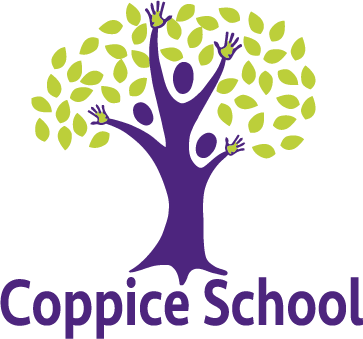Powerful Parents
This page is here to give you some ideas about the things we do in school and offer opportunities for you to find out more if you want to, or get support if you need some. We hope you find them useful.
Finding out more:
If you are interested in learning about any of the approaches we use in school and would like to find out more, please follow the below links to sites that can give you more information/resources.
For parent support, there are lots of resources out there. Some general ones are listed here but please contact school if there is something more specific you need. We're here to help and can signpost you to the best person/service to support you :-)
Coronavirus Information and resources
We will keep this area updated as frequently as we can to give you information and resources specifically related to the COVID-19 outbreak. Please check back regularly.
Here is the link to the government website where you can find updates and advice relating to the coronavirus. https://www.gov.uk/coronavirus
Nosy Crow have published a downloadable book about coronavirus for children, illustrated by the wonderful Axel Scheffler of Gruffalo fame. It is free to download and can be found here:
https://nosycrow.com/wp-content/uploads/2020/04/Coronavirus-A-Book-for-Children.pdf
Another useful book about the current situation, maybe for older young people, can be found here:
https://en.calameo.com/read/000777721945cfe5bb9cc?authid=Xu9pcOzU3TQx
This video assembly by the NSPCC is designed to help children and young people know what they can do if they're worried or concerned about anything. It might be worth watching together and talking about our current situation if you feel your young person might be worried.
Here's a really useful document for families on supporting children with Learning Disabilities/ASD: Coping with COVID-19 Isolation. It has lots of ideas on how to structure your day, how to manage handwashing, sensory needs and your own needs during this time. Lots of activities to try with your young person too :-)
https://councilfordisabledchildren.org.uk/help-resources/resources/supporting-children-learning-disability-asd-coping-covid-19-isolation
If your young person is struggling to understand why they need to wash their hands properly, have a look at this science experiment:
https://www.mumstrife.com/food/washing-hands/?fbclid=IwAR1ZGpPwwz0wMa6Mg-EJnOviVP_TZ-zpRwSa3HT8zu5ps1vGUWOjw_9IgZc
it's a good visual way of showing how easily bugs can get shared. More resources on hand washing are in the downloads.
And here's a link to an easy read guide (with photo symbols) to the virus and what to do that you can share with your young person if they are worried.
https://assets.publishing.service.gov.uk/government/uploads/system/uploads/attachment_data/file/874281/COVID-19_easy_read.pdfThe picture information images below are another way to help your young person understand what to do.
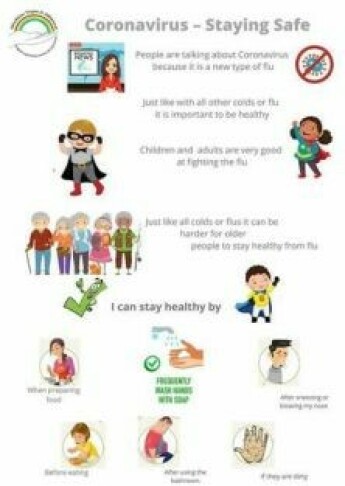
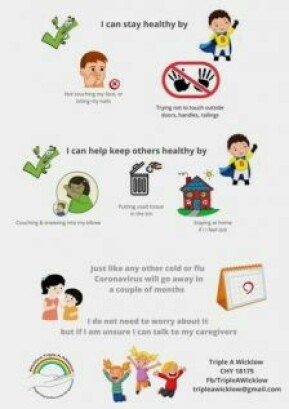
We have also written some social stories supported by Makaton symbols (downloads at the bottom of the page) for different situations you might find yourself in.
If your young person is worried about COVID-19, here's a link to the NSPCC which give pointers about how to cope with anxiety and other mental health challenges during this time.
https://www.nspcc.org.uk/keeping-children-safe/childrens-mental-health/depression-anxiety-mental-health/
And this one is written specifically for people with Autism:
https://afirm.fpg.unc.edu/supporting-individuals-autism-through-uncertain-times
For those who are regularly on the internet, here's a blog about internet safety for children and young people during the COVID-19 outbreak.
https://www.saferinternet.org.uk/blog/keeping-children-happy-and-safe-online-during-covid-19
This website has some useful information for parents and professionals about how to cope with online learning and staying safe online.
https://www.saferinternet.org.uk/blog/working-remotely-advice-professionals-parents-posh-rhc
The most important thing to remember at this challenging time is to stay connected with your young person and wider family Here is a link to some practical ways to keep your family as normal as you can while they are not at school.
https://www.epinsight.com/post/i-see-you-being-connected-during-the-coronavirus-crisis
And if you're trying to build in some home learning, Noodle Nook has a useful guide to homeschooling children with special needs here:
http://www.noodlenook.net/supporting-special-needs-students-online/
Your Kids Table has written a blog called 'the ultimate parenting guide to thriving during quarantine' which is worth a read, particularly if your child is a picky eater. Alisha Grogan is a therapist in the USA who specialises in helping families with picky eaters and sensory challenges and her resources are worth checking out if this is a concern of yours.
https://yourkidstable.com/coronavirus-quarantine-parents-guide/?inf_contact_key=c931e3a3a7063f5b37dc2f62c3c7beab1b0a3f0fd3ee5d9b43fb34c6613498d7
What might your sanity saver schedule look like? This article gives suggestions for balancing kids, parents, work and routine. It might be worth thinking what could work for you if your young person is very routine-based and likes to know what is happening throughout the day. There are other daily schedule templates floating around on the internet so have a look for some inspiration if this one doesn't appeal :-)
https://www.spillaneconsulting.co.uk/single-post/2020/03/16/What-might-your-Sanity-Saver-Schedule-look-like-in-case-of-a-lock-down
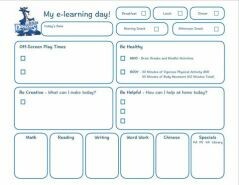
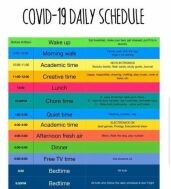
This guide from Red Apple Reading suggests 7 tips for homeschooling a child with special needs. It is written for parents who choose to take their child out of school, but some of the points are definitely relevant to our current situation :-)
https://www.redapplereading.com/blog/2018/11/7-tips-for-homeschooling-a-child-with-special-needs/
And if your young person puts everything in their mouth, this is a useful guide for cleaning those difficult toys, with lots of easy and practical tips that may be useful.
https://cleanmyspace.com/how-to-clean-baby-kids-toys
If you fancy a challenge, here are some tips from the OT Toolbox on practical ways to help your child to blow their own nose :-)
https://www.theottoolbox.com/tips-help-kids-learn-how-to-blow-their-nose/
Learning
Makaton is the sign and symbol system we use in school. You can buy resources from the Makaton Charity but they are also very good at providing freebies!
https://www.makaton.org/shop/shopping/browseStore/Free-resources
If you are using Makaton at home, and would like to revise the signs to make sure they are accurate, this USB stick is a really good resource and has all of the Core Vocabulary signs as video clips.
https://www.makaton.org/shop/shopping/stockDetails/CVVideo.
Alternatively, head to https://wetalkmakaton.org/ to the Sign of the Week to learn new vocabulary. All the old videos are available on Youtube too for free :-)
We also run Makaton courses through school and are looking to try to make these more accessible for parents. If you'd like to come on a course, please ring school and let us know the best time for you.
If your young person uses or might need to use a device to help them communicate, this video will explain what it's all about :-)
The Inspired Treehouse is a really good site for sensory based OT and Physio activities which are suitable for all our young people and is run by therapists who know their stuff :-)
https://theinspiredtreehouse.com/
GriffinOT has a brilliant YouTube channel to explain about sensory processing - some of the terms people use and what they mean - and how to use some of the equipment. She is also currently running a fine motor skills daily activity for children and young people to have a go at.
And the Portage website has lots of hints and tips about helping your child master different skills.
https://www.portage.org.uk/support/resources/parent-list/317
Online Safety is a big worry for many parents. This free guide (just register to download) gives all the main information you need to help keep your young person safe online.
https://2simple.com/free-stuff/digital-parenting/
If your child is learning phonics, it can be confusing to know where to start and how to help, Carter's Yard Phonics has a super guide for parents to help you out. It can seem very different from the way we were taught at school! They also have augmented reality cards you can download for free till summer 2020.
https://sites.google.com/cartersyardphonics.com/cyp-school-closures/parent-support?authuser=0
DIR Floortime (Stanley Greenspan) - We are beginning to use this model and seeing progress in our young people, but it is based on some fairly heavy child psychology. It's a very interesting model if you like the science bit, but otherwise feel free to pass :-)
For those in Upper School, The NSPCC has produced some learning resources around emotions, relationships and identity. Have a look and see if you think they might be useful to discuss with your student.
https://learning.nspcc.org.uk/research-resources/schools/love-life/
And for those in Lower School, check out the Talk PANTS resource from the NSPCC - designed for use with children from 3 years old.
https://learning.nspcc.org.uk/research-resources/schools/pants-teaching/
Support
If you need a bit of support from parents who 'get' Autism, check out the local Autism links page where you can find information about Doncaster Autistic Society and links to other groups and providers across the country.
https://www.autismlinks.co.uk/support-groups/group-support-yorkshire-and-humberside/doncaster-autistic-society?region=
For general information on parenting strategies, this is the course that is recommended by early help:
www.doncaster.gov.uk/services/schools/parenting-programmes
And information about short breaks can be found here:
www.doncaster.gov.uk/services/schools/short-breaks
Sensory Stuck at Home is a Facebook group for parents and people with sensory needs to share ideas and get support.
https://www.facebook.com/groups/sensorystuckathome
Amethyst Schaber is an autism advocate (and autistic herself) and her "ask an autistic" series is well worth a watch, particularly if friends and neighbours don't get what it's like. This episode includes links for non-verbal autistic advocates as well as verbal advocates like herself.
We hope we're easy to get in touch with and friendly when you do chat with us, but just in case, here's a nice guide for parents about communicating with schools - we really do want you to keep in touch :-)
https://www.driveryouthtrust.com/wp-content/uploads/2020/01/Top-Tips-for-Parents-final.pdf
Downloads
Coronavirus Social Story with Makaton sentences
Coronavirus Social Story with Makaton - key info
Going into hospital Social Story with Makaton
Handwashing tips for sensory people
What I can do when I feel happy/sad/worried
Think Autism leaflet - links to services
Top Techniques for Communication
Supporting communication - Beginning communicator
Supporting Communication - Continuing Communicator
Supporting Communication - Communication Passport
Makaton toileting symbols - Boys and Girls
Inexpensive Sensory Play ideas
Jo Grace's Guide to Sharing Sensory Stories
